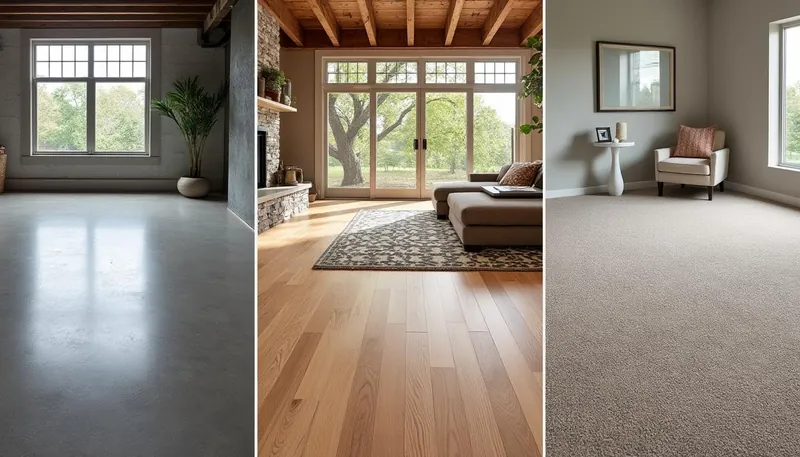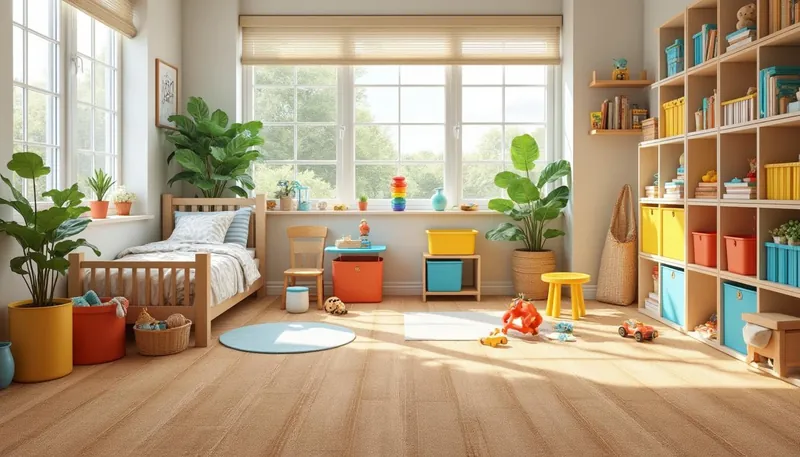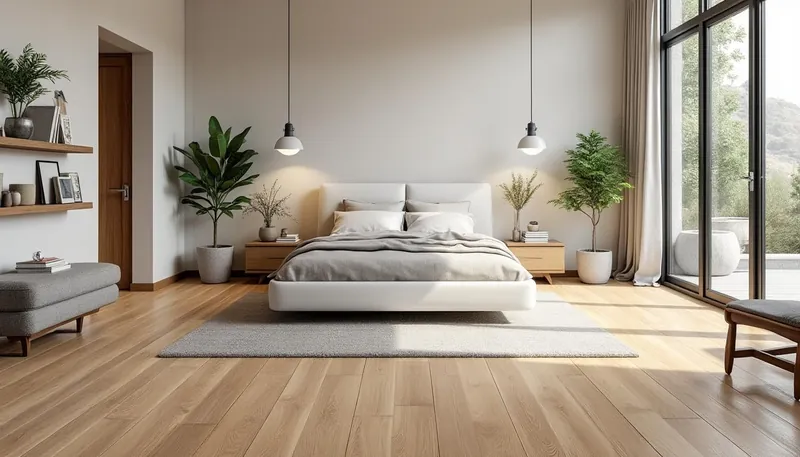If you’re looking to transform your basement into a cozy retreat or a functional space, choosing the right flooring is essential. The unique challenges presented by basements, like moisture, humidity, and cold temperatures, make this decision even more critical. Don’t fret! In this guide, we’re diving into the best flooring options specifically tailored for basements, ensuring you can make a well-informed choice that aligns with your needs and preferences. From luxurious vinyl planks to durable tiles, let’s explore the top contenders that combine aesthetics with functionality, keeping both comfort and budget in mind.
Brief
- Choosing the right basement flooring combines aesthetics, functionality, and durability. 🏠
- Key options include Luxury Vinyl Plank (LVP), porcelain tiles, epoxy coatings, waterproof carpet tiles, and engineered wood. 🛠️
- Consider moisture resistance, ease of installation, comfort, and your basement’s primary use when selecting flooring. 🌧️
- Brands such as Pergo, Armstrong Flooring, and Mohawk provide high-quality options tailored for basements. 💼
- Always evaluate your budget and the level of maintenance each flooring type requires. 💰
Why Waterproof Flooring is Essential for Basements
To start, understanding the importance of waterproof flooring is critical. Basements naturally encounter moisture due to their below-grade position, making them susceptible to dampness from water vapor, occasional leaks, and flooding. This isn’t just a nuisance; it can lead to significant damage over time, including mold growth and structural other issues.
Let’s break down why selecting waterproof flooring is paramount:
- Moisture Defense: Regular flooring like hardwood is almost always a no-go for basements due to its susceptibility to warping. Waterproof options like Porcelain Tile and Luxury Vinyl Plank (LVP) are designed to resist moisture, ensuring a long-lasting investment. 🚫
- Mold Prevention: Maintaining dry conditions is key in combating mold. Since many traditional flooring choices retain moisture and promote mold growth, opting for non-organic materials can help keep your indoor air quality high. 💨
- Ease of Maintenance: Waterproof floors are often easier to clean and maintain, which is a boon for busy households or multi-functional basements where spills and dirt are a concern. 🧼
Ultimately, ensuring your basement floors are waterproof contributes to both the longevity of your space and the health of your home environment. Did you know you could have peace of mind while enjoying that new lounge area or playroom? Well, selecting the right waterproof flooring can provide just that!
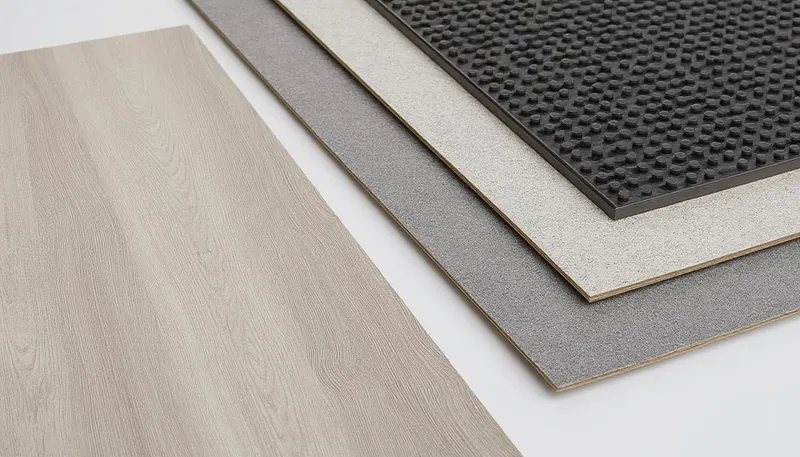
Top Choices for Waterproof Basement Flooring
Now that we’re all enlightened about the need for waterproof flooring, let’s dive into the standout options that you can consider:
| Flooring Type | Waterproof Level | Durability | Installation Ease | Average Cost/sqft |
|---|---|---|---|---|
| Luxury Vinyl Plank (LVP) | Excellent | High | Easy | $4 – $16 |
| Porcelain Tile | Excellent | Excellent | Hard | $7 – $24 |
| Epoxy Coating | Excellent | Excellent | Hard | $3 – $12 |
| Carpet Tiles (Waterproof) | High | Medium | Easy | $2 – $8 |
| Engineered Wood | Low | Medium | Variable | $6 – $15 |
With all these choices, it’s evident that there are solutions out there to fit various aesthetics and functional needs. Each flooring type has its unique characteristics that cater to the diverse environments found in basements. Hence, it’s all about aligning these attributes with how you intend to use that space.
Understanding Durability: Choosing Floors to Last
One of the most significant considerations in the choosing process is durability. Given that basements can be high-traffic areas due to their multifunctional use, your flooring needs to withstand wear and tear. Dents, scratches, and impacts can all take a toll on regular flooring materials.
Here’s what to think about regarding durability:
- Material Resilience: Flooring options like Porcelain Tile and Epoxy Coating are exceptionally hard and resist most forms of damage. They stand up against heavy foot traffic and accidental drops. 💪
- Wear Layer Thickness: When it comes to Luxury Vinyl Plank (LVP), choose products with a thick wear layer (ideally 20 mil or more) for enhanced durability. It’s the best way to dodge scratches and scuffs. 🔒
- Lifespan Advantage: Investing in higher-quality flooring now minimizes replacement costs down the road. Brands like Mohawk and Shaw Floors offer long-lasting products that prove valuable over time. ⏳
Ultimately, a focus on durability ensures that whichever flooring you pick will endure everyday use, keeping your basement looking fresh and new for years to come. Investing in durable flooring, such as laminate or even epoxy coatings, can actually save you bucks in maintenance and replacement.
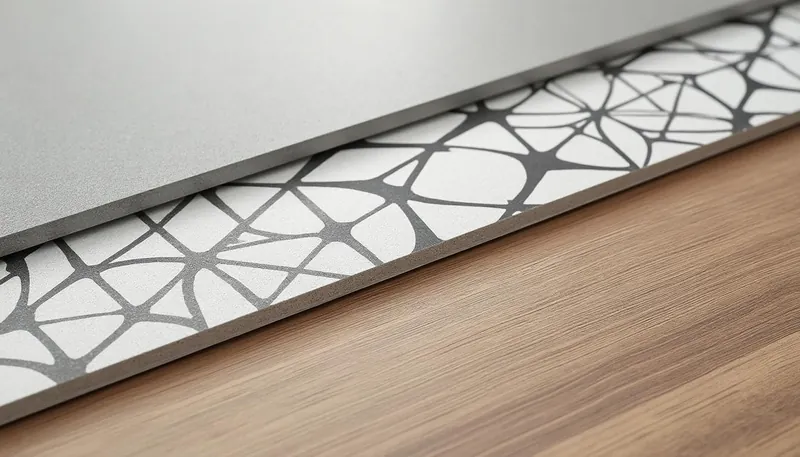
Popular Durable Flooring Options
Let’s delve deeper into the flooring materials that are renowned for their durability, making them ideal for basement environments:
| Flooring Type | Durability Level | Maintenance | Cost |
|---|---|---|---|
| Porcelain Tile | Exceptional | Low | $7 – $24+ |
| Epoxy Coating | Exceptional | Minimal | $3 – $12 |
| Luxury Vinyl Plank (LVP) | High | Easy | $4 – $16 |
| Rubber Flooring | Excellent | Low | $3 – $10 |
| Laminate Flooring | Moderate | Medium | $2 – $8 |
Durability will not only keep your basement looking sharp but also supports its overall functionality. It’s about ensuring that your chosen flooring can cope with whatever life throws at it!
Comfort and Warmth: Enhancing Your Basement Living Space
Let’s face it – basements can often feel uninviting due to cold, hard concrete floors. By focusing on comfort and warmth in your flooring choice, you can create a relaxing and enjoyable environment.
Consider these comfort aspects when selecting your basement flooring:
- Insulation Properties: Flooring materials like carpet tiles or engineered wood can add warmth underfoot, directly combating that chilly basement vibe. ❄️
- Acoustic Benefits: Certain materials, notably carpets or rubber, help absorb sound, providing a more peaceful environment in a bustling household. 🐾
- Feel Underfoot: Always test how a flooring option feels; softer options like carpet or foam provide a pleasant touch, ideal for families and entertainment spaces. 👣
Creating a warm, inviting atmosphere goes beyond just aesthetic choices; it’s about enhancing your overall experience in the space. Selecting materials that contribute to comfort and warmth, like carpeted areas for a playroom or cozy vinyl plank floors for a family gathering spot, will elevate how you use your basement.
Top Comfort-Enhancing Flooring Types
Here’s a selection of flooring types that excel in comfort and warmth:
| Flooring Type | Comfort Rating | Warmth | Usage |
|---|---|---|---|
| Carpet Tiles | High | Warm | Living Areas |
| Engineered Wood | Medium | Warm | Family Rooms |
| Luxury Vinyl Plank (LVP) | Medium | Medium | Multi-Use Spaces |
| Foam Flooring | Excellent | Warm | Play Areas |
| Rubber Flooring | Medium | Cool | Workshops/Gyms |
Prioritizing comfort helps transform a neglected basement into an atmosphere that’s not just functional but truly enjoyable. After all, why spend time in a room that feels uncomfortable when you could create a warm and inviting space instead?
Budgeting for Basement Flooring: Making Smart Choices
When blasting through the various flooring types and styles, it all comes down to how much you’re willing to spend. Your budget will play a pivotal role in your decision-making process.
Keep these budgeting tips in mind:
- Evaluate Material Costs: Excellent quality flooring does not come cheap, so prioritize materials that offer longevity and required qualities over cheap options that might need replacing sooner. 💰
- Installation Expenses: Adjust your budget according to whether you’ll DIY or hire professionals. While hiring offers a clean finish, doing it yourself can significantly cut costs. 💼
- Long-Term Value: Always factor in the long-term benefits and durability of your flooring choice versus its initial cost. Cheaper isn’t always better if it requires frequent replacement. 📈
Engaging with reputable brands like Mohawk, Armstrong Flooring, or TrafficMaster can offer both affordability and reliability. A well-thought-out budget incorporating installation costs and future potential updates will keep your project on track without breaking the bank.
| Cost Factor | Considerations | Average Cost |
|---|---|---|
| Flooring Material | Quality & Durability | $2 – $24+ |
| Installation Method | DIY vs. Professional | $0 – $8+ |
| Subfloor Needs | Insulation, Vapor Barrier | $1 – $3+ |
| Maintenance Level | Long-Term Care Costs | Varies |
A thorough understanding of your budget will lead to better-informed choices that optimize your investment and enjoy the benefits of a revitalized basement space.
What is the best flooring for high moisture areas?
The best flooring for high moisture areas includes Luxury Vinyl Plank (LVP), Porcelain Tile, and Epoxy Coating. These materials are specifically designed to withstand moisture without damage.
Are carpet tiles suitable for basements?
Yes, if you choose waterproof carpet tiles, they are an excellent choice for basements, providing comfort while being easier to replace if damaged.
How can I make my basement warmer?
To make your basement warmer, consider using carpet tiles or engineered wood and include underlayment or radiant heating for extra warmth.
What flooring is cheapest for basements?
The cheapest flooring option for basements is painted concrete, followed closely by waterproof vinyl plank or peel-and-stick carpet tiles.
How do I deal with basement moisture?
To deal with basement moisture, ensure good drainage around the foundation, use a dehumidifier, and select waterproof flooring materials.
